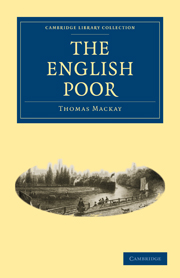Book contents
- Frontmatter
- PREFACE
- Contents
- CHAPTER I PROPERTY THE MAIN CONDITION OF SURVIVAL. THE GENERAL PROPOSITION STATED
- CHAPTER II THE SAME CONSIDERED HISTORICALLY. PRIMITIVE FORMS OF SOCIETY AND THE VILLAGE COMMUNITY
- CHAPTER III ENGLISH VILLENAGE
- CHAPTER IV THE BLACK DEATH AND THE DIVORCE OF THE LABOURER FROM THE LAND
- CHAPTER V THE INCREASE OF SHEER-FARMING, AND THE GROWTH OF A PROLETARIATE
- CHAPTER VI TOWN LIFE AND THE TRADE GILDS
- CHAPTER VII SOCIAL LEGISLATION AND THE POOR LAW
- CHAPTER VIII THE INDUSTRIAL REVOLUTION OF THE EIGHTEENTH CENTURY
- CHAPTER IX THE THEORY OF WAGES
- CHAPTER X PRIVATE PROPERTY AND POPULATION
- CHAPTER XI THE MODERN ASPECT OF THE POOR LAW
- CHAPTER XII THE POOR LAW, continued
- CHAPTER XIII INSURANCE A SUBSTITUTE FOR THE POOR LAW
- CHAPTER XIV SOME FORMS OF SOCIALISTIC LEGISLATION
- CHAPTER XV THE ETHICAL ASPECT OF THE QUESTION
CHAPTER I - PROPERTY THE MAIN CONDITION OF SURVIVAL. THE GENERAL PROPOSITION STATED
Published online by Cambridge University Press: 29 August 2010
- Frontmatter
- PREFACE
- Contents
- CHAPTER I PROPERTY THE MAIN CONDITION OF SURVIVAL. THE GENERAL PROPOSITION STATED
- CHAPTER II THE SAME CONSIDERED HISTORICALLY. PRIMITIVE FORMS OF SOCIETY AND THE VILLAGE COMMUNITY
- CHAPTER III ENGLISH VILLENAGE
- CHAPTER IV THE BLACK DEATH AND THE DIVORCE OF THE LABOURER FROM THE LAND
- CHAPTER V THE INCREASE OF SHEER-FARMING, AND THE GROWTH OF A PROLETARIATE
- CHAPTER VI TOWN LIFE AND THE TRADE GILDS
- CHAPTER VII SOCIAL LEGISLATION AND THE POOR LAW
- CHAPTER VIII THE INDUSTRIAL REVOLUTION OF THE EIGHTEENTH CENTURY
- CHAPTER IX THE THEORY OF WAGES
- CHAPTER X PRIVATE PROPERTY AND POPULATION
- CHAPTER XI THE MODERN ASPECT OF THE POOR LAW
- CHAPTER XII THE POOR LAW, continued
- CHAPTER XIII INSURANCE A SUBSTITUTE FOR THE POOR LAW
- CHAPTER XIV SOME FORMS OF SOCIALISTIC LEGISLATION
- CHAPTER XV THE ETHICAL ASPECT OF THE QUESTION
Summary
The Institution of Property has been a principal condition of man's survival in the struggle for existence.
He has been able to produce more wealth than was needed to satisfy the wants of the passing hour. Relative to the surplus wealth so created, there has grown up in man's mind the instinct of appropriation, in its fuller development, the legalised principle of property. This has been man's most potent weapon of self-preservation. Ethnologists and jurists can supply us with some of the details of the process, for the instinct which has made property a necessity in all civilised society has been curiously interwoven with fictions of custom, religion, and law. Still out of the obscurity which surrounds the history of primitive ideas one fact stands clearly forth, namely, that property owes its origin mainly to the compulsion which is laid on men, as well as on other creatures, to defend themselves from each other and from the hostile forces of nature. At the very outset of his career, as presented to us in history, man appears to be relinquishing the hand-to-mouth life of the animal, and to be already armed with this instinct, which has raised about him the structure of modern civilisation. Each step in human progress has involved a further reliance on the industry which produces wealth, on the principle of property which protects it, and also a wider departure from the conditions which give to animals an uncertain survival in the struggle for existence.
- Type
- Chapter
- Information
- The English Poor , pp. 1 - 23Publisher: Cambridge University PressPrint publication year: 2009First published in: 1889



